

Then fear not as in this guide, we will be taking a closer look at a theory called behaviour modification principle which consists of reinforcements and punishments. Parents can then gain more knowledge and skills and decide how they can implement these into their parenting methods.
Parents can use reinforcement and punishment to influence the behaviour of their teenage children. At this stage of growing up, teenage children are more assertive and want to take more autonomy in their own decisions. Hence, they may perceive as being rebellious. Studies have found that it is ideal to use positive reinforcement and remove punishment. An example of behaviour that parents may want their teenage children to do is to complete their school work.
Discipline for Teens: Strategies and Challenges. When your child becomes a teenager, your parenting role is likely to shift.
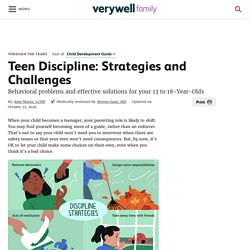
You may find yourself becoming more of a guide, rather than an enforcer. That’s not to say your child won’t need you to intervene when there are safety issues or that your teen won’t need consequences. But, by now, it’s OK to let your child make some choices on their own, even when you think it’s a bad choice. Typical Teen Behavior Teens like to test the limits of their independence.1 So don’t be surprised when your teen argues with you when you say no, or when they go behind your back to do as they please. Adolescence can be a tumultuous time for teens as they change physically, emotionally, and socially. Meanwhile, as friends and romantic relationships grow increasingly important, your teen will want to spend more time with their peers. Your teen also will want more privacy. Although that can be unnerving at times, all of these changes are a normal part of growing up. Common Challenges Remove electronics.
Teens Talk About Family.
[How Operant Conditioning Works] B.F. Skinner. How Reinforcement and Punishment Modify Behavior Operant conditioning, also known as instrumental conditioning, is a method of learning normally attributed to B.F. Skinner, where the consequences of a response determine the probability of it being repeated. Through operant conditioning behavior which is reinforced (rewarded) will likely be repeated, and behavior which is punished will occur less frequently. By the 1920s, John B. Watson had left academic psychology, and other behaviorists were becoming influential, proposing new forms of learning other than classical conditioning. Skinner’s Operant Conditioning: Rewards & Punishments.
What Is Reinforcement in Operant Conditioning? One of the many different ways in which people can learn is through a process known as operant conditioning (also known as instrumental conditioning).1 This involves learning through reinforcement or punishment.
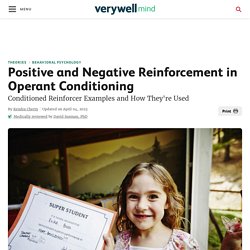
The type of reinforcement used can play an important role in how quickly a behavior is learned and the overall strength of the resulting response. Understanding Reinforcement Reinforcement is a term used in operant conditioning to refer to anything that increases the likelihood that a response will occur. Psychologist B.F. Skinner is considered the father of this theory. For example, reinforcement might involve presenting praise (the reinforcer) immediately after a child puts away her toys (the response). Reinforcement can include anything that strengthens or increases a behavior, including specific tangible rewards, events, and situations. (Positive Reinforcement examples) Positive Reinforcement in Psychology (Definition + 5 Examples)
If you read our earlier piece on positive punishment, you know that there are different methods of teaching and instilling good habits and behaviors.
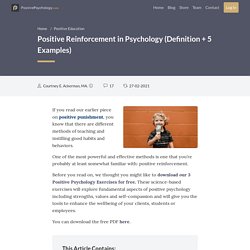
One of the most powerful and effective methods is one that you’re probably at least somewhat familiar with: positive reinforcement. Before you read on, we thought you might like to download our 3 Positive Psychology Exercises for free. These science-based exercises will explore fundamental aspects of positive psychology including strengths, values and self-compassion and will give you the tools to enhance the wellbeing of your clients, students or employees.
You can download the free PDF here. Positive Reinforcement - The Big Bang Theory.
Positive vs Negative Reinforcement in ONE Minute. Fixed interval. Fixed ratio. Variable interval. Variable ratio. Schedules of reinforcement. Effectiveness of schedules of reinforcement (Graph) Positive punishment and how parents can use this to influence the behaviour of their teenage children. Negative punishment and how parents can use this to influence the behaviour of their teenage children. (Negative Punishment examples) Negative Punishment Examples and Scenarios. Nobody ever wants their stuff taken away.
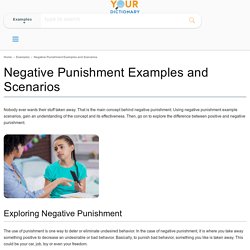
Negative Punishment. [Table Diagram] Reinforcement Versus Punishment. (Positive Punishment and Negative reinforcement examples) 12 Examples of Positive Punishment & Negative Reinforcement. You might be thinking that “positive punishment” sounds like an oxymoron, after all, how can punishment be positive?
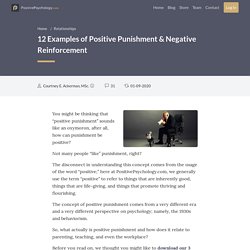
Not many people “like” punishment, right? The disconnect in understanding this concept comes from the usage of the word “positive;” here at PositivePsychology.com, we generally use the term “positive” to refer to things that are inherently good, things that are life-giving, and things that promote thriving and flourishing. The concept of positive punishment comes from a very different era and a very different perspective on psychology; namely, the 1930s and behaviorism. So, what actually is positive punishment and how does it relate to parenting, teaching, and even the workplace? Before you read on, we thought you might like to download our 3 Positive Psychology Exercises for free. You can download the free PDF here. Operant Conditioning - Negative Reinforcement vs Positive Punishment.
Which is better, rewards or punishments? Neither. Follow our new CNA LIFESTYLE page on Facebook for more parenting stories and videos NEW YORK: “I feel a sense of dread as bedtime rolls around.

Here we go again.” A dad said this in our family therapy office one day, describing his son’s pre-bed antics. The child would go wild as bedtime approached, stubbornly ignoring his parents’ directions and melting down at the mention of pajamas. The parents felt frustrated and stumped. They asked us a question we hear a lot: Should they sternly send him to time out and take away his screen time when he acted this way (punishments)? Many parents grew up with punishments, and it’s understandable that they rely on them. So rewards are the positive choice then, right? Not so fast. Over decades, psychologists have suggested that rewards can decrease our natural motivation and enjoyment. Rewards have also been associated with lowering creativity. People who were told they’d be rewarded to solve this dilemma took longer, on average, to figure it out.
Why Positive Reinforcement is Better than Punishment - Clever Little Monkey. Psychologists often encourage parents to adopt strategies of classic behaviour modification to alter their children’s challenging, naughty behaviours instead of using positive reinforcement techniques.

The theory is that the immediate consequence that you receive after performing an action makes you more or less likely to repeat the action in future. Punishment strategies are old news Historically, this meant that we often focused on punishment strategies, for example giving children hidings or extra homework and chores as a consequence to their undesirable behaviour. However punishment, especially corporal punishment, such as physical hidings and caning, usually only angers and frustrates the child, while also potentially being destructive to the parent-child relationship. Unfortunately, some parents struggle with finding the appropriate boundary between corporal punishment and physical abuse. The Study of Punishment in Psychology. Punishment is a term used in operant conditioning to refer to any change that occurs after a behavior that reduces the likelihood that that behavior will occur again in the future.
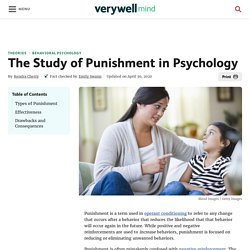
While positive and negative reinforcements are used to increase behaviors, punishment is focused on reducing or eliminating unwanted behaviors. Punishment is often mistakenly confused with negative reinforcement. The difference: Reinforcement increases the chances that a behavior will occur and punishment decreases the chances that a behavior will occur. The Best Gift for Your Child.